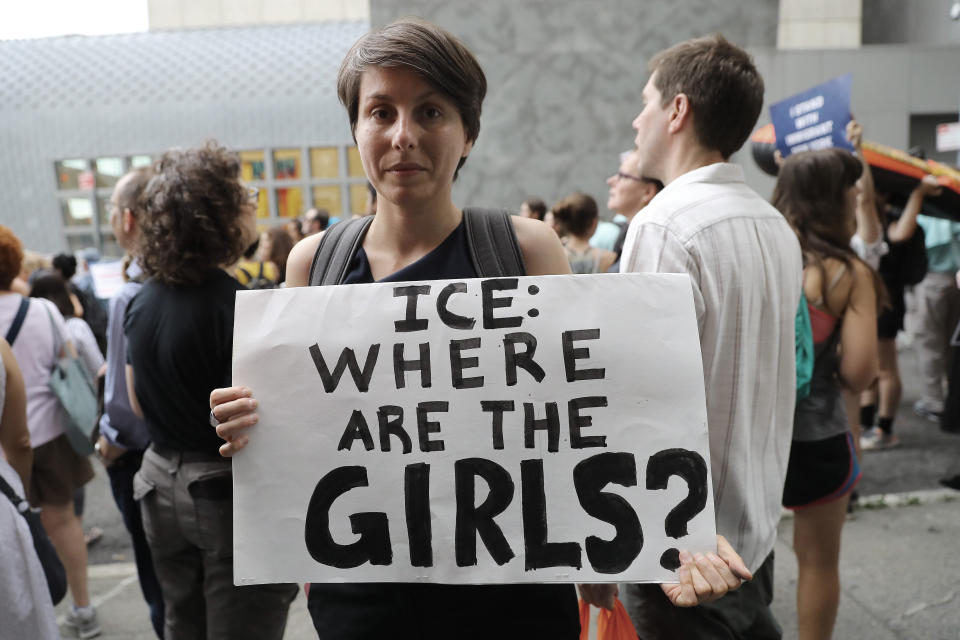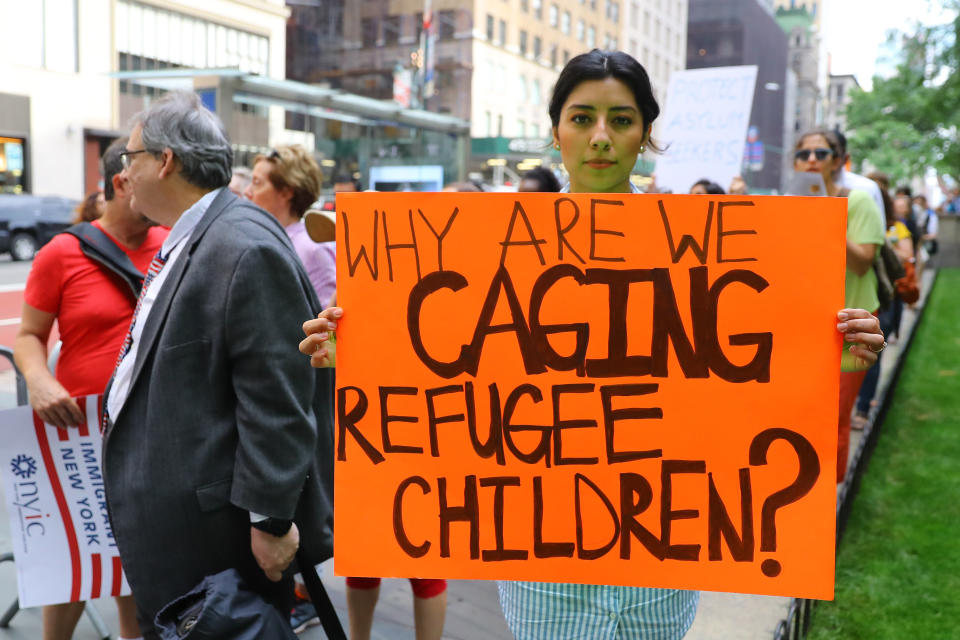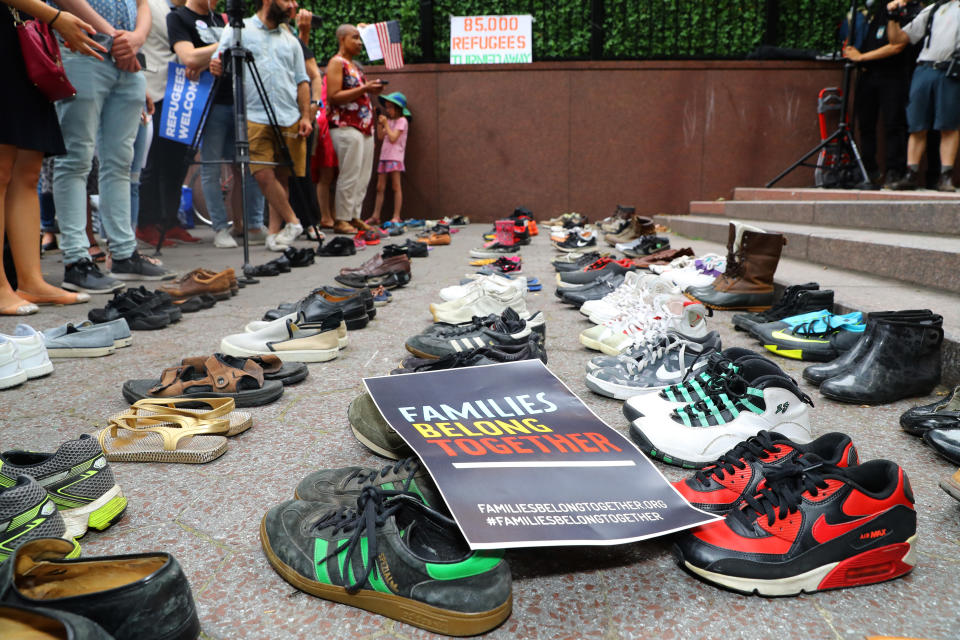The women who marched on World Refugee Day

Hundreds of New Yorkers from immigrant communities and other activists staged a march and rally in observance of World Refugee Day on Wednesday. This march, unlike the Women’s March earlier this year, fell on a weekday. Marchers came from work, some having picked up their children from childcare to bring them along. They came before dinnertime and rush hour. They held signs of refugees who died in transit, carried rafts above their heads, and pushed empty strollers to send a message to the administration: “When refugees are under attack — stand up, fight back.”
President Trump’s hardline immigration stances — including this week’s firestorm over separating children from families when they illegally cross the U.S. border seeking asylum — created a new atmosphere of urgency in this year’s march.
Many of the people who showed up were women.

Take Jane, for instance, who came to America in 1990 with her parents. When asked why she showed up to march, she replied: “It’s not hard to come down here and protest. Where else would I be? At the movies? Home watching this on TV?”
Jane said she feels a personal responsibility to draw attention to refugees and immigrants suffering. “I was a refugee from the Soviet Union,” she said. “Now I am a U.S. citizen. I was in the political refugee program to bring Jewish people from the Soviet Union, but I was never in a refugee camp. It was sheer luck that I was able to come here and get to be white in this country.”
Photos: Immigration rally in NYC to mark ‘World Refugee Day’ »
Becoming a citizen gave her a sense of permanence, a feeling she said other refugees are seeking. “People don’t just come here to earn money,” she said, before reciting a quote she read earlier today: “No one puts their children on a boat unless the water is safer than the land.”
Mothers like Evelyn Malave wondered what a child in detention feels without their parents. She considered her 18-month old son. “Every single time I put my kid to bed, I think about those children,” said Malave. “He cries when I go to work still. And those kids are younger than him. I can only imagine what they’re feeling. But you only had to have been a child to know.”
Eva Young, a psychologist who works with children, didn’t have to imagine what minors in detention might be experiencing. “I know what trauma these children are going through,” said Young. “It’s life long, and the younger they are, the longer the trauma will be. It’s hard work to rebuild attachment bonds, especially when they can’t be held and feel like there is some safety in the world.”

Charlotte and Amelia, a pair of 11-year old friends from Brooklyn, marched a few feet ahead of Young. Together they hold up a small sign that read, “‘Where did Mama go?’ — Thousands of children.” When asked why she was marching, Charlotte said, “I’m marching because children are being separated from their parents. We realized that if we were separated from our parents that would be devastating.” Amelia picks up right after her friend and said, “When they come to America they think this will be a safe place for them, so we have to make sure they’re safe.”
Leydi Sosa left her job at HAIS, a Jewish refugee aid organization, to bring her 4-year-old son to the rally. “I took him to the Women’s March too,” said Sosa. “He comes from a long line of immigrants.” Sosa immigrated to the U.S. 23 years ago with her mother, and lives in the Bronx. “As a mother, I can’t imagine what it’s like to be separated,” said Sosa, repositioning her son who sits atop a police barricade. “We separate for four seconds and I can’t stand it.

Kujegi Camara, like Sosa’s son comes from an “immigrant background.” Her came to America from Gambia in West Africa. Today, she works for Sauti Yetu Center for African Women and Families, giving relief to black immigrant women and their families. “I’ve seen women and men come to my office who are fleeing violence,” said Camara. “They left everything to seek refuge in the U.S. It’s a chance to reunite with their families and to go to sleep at night without fear.”
Ashley Portillo, who also provides public health services to immigrants at the Academy of Medical and Public Health Services, said she takes the ill-treatment of immigrants personally. “My parents came here undocumented in 1985 from Guatemala,” said Portillo, “so when people say racist inflammatory statements against immigrants, it cuts deep.” In her line of work, she is exposed to hardships faced by refugees and immigrants. “We hear traumatic stories all the time, but I’ve never seen anything like this,” she said, referring to families separated at the border.

But another protester, Becca Asaki, said she had seen something like this before, although not firsthand. When Asaki’s grandmother was a child, she was taken from her father and placed in a Japanese internment camp. “There’s a clear similarity between immigrants who are targeted today and how Japanese Americans were treated in World War II under the auspice of security,” said Asaki, shouting about the marchers’ chants. “I’m glad people are having the conversation about detention centers as internment camps.”
Laura Finfer, a psychologist, also connected the present to the past: “My family died in the Holocaust,” she said. “To me, what’s happening now, cruelly separating people who are different, dehumanizing them, treating them like criminals, is the same thing that happened back then.”
The march runs late into the evening, pooling at a plaza blocks away from United Nations headquarters and directly across the street from Trump World Tower. The remaining marchers, crowd around eighty-five shoes lined up to represent the drop in refugee admission from 100,000 in 2017 to 15,000 in 2018. Silence, for the first time in hours, fell across the marchers as they closed their eyes to pray. In the background, shrieks of laughter from nearby children playing tag filled the quiet.

*****
Oath provides support to refugees through an annual partnership with the Tent Foundation by donating in-kind media to a number of nonprofits serving this cause.
To further support and empower displaced peoples from around the world, donate to the following organizations.
No One Left Behind
Near East Foundation
Kiva
_____
Read more from Yahoo News:



